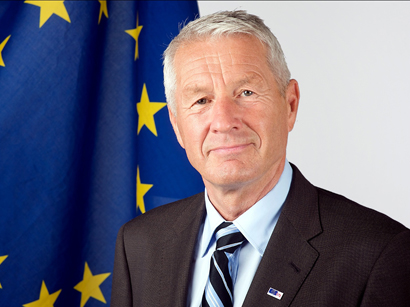
The Council of Europe has no mechanisms and means to solve the Azerbaijani refugees’ problem, which is very acute, Secretary General of the Council of Europe Thorbjorn Jagland said, Trend reports.
Jagland was answering a question of Chairman of the Azerbaijani Parliament’s Committee for Culture Rafael Huseynov during the PACE winter session in Strasbourg, France.
Huseynov told Jagland that he didn’t take any practical steps to resolve the problem of more than one million Azerbaijani refugees while being a secretary general.
Huseynov added that instead of using general words and shifting the responsibility to the OSCE, Jagland could take specific steps taking advantage of his high position. Huseynov asked whether Jagland felt responsible for not taking those actions.
Jagland answered that he doesn’t have any means to solve this problem. He said if he applied to the OSCE or the UN, to the UN High Commissioner for Refugees they would say the same.
Jagland said he doesn’t have such a mandate, adding that he has another mandate and is trying to implement it.
Jagland said he doesn’t see any possibility for the Council of Europe to solve the refugee problem mentioned by Huseynov.
Of course, this is a terrible situation for those who found themselves in it, Jagland added.
The PACE winter session will continue until January 25.
A delegation headed by Chairman of the Parliamentary Committee for International and Inter-Parliamentary Ties Samad Seyidov included Head of the Committee for Culture Rafael Huseynov, MPs Sabir Hajiyev, Ganira Pashayeva, Ulviya Aghayeva, Sevinj Fataliyeva, Elshad Hasanov, Fazil Mustafa, Asim Mollazade, Chingiz Ganizade, Sahiba Gafarova and Nagif Hamzayev.
Over one million Azerbaijanis became refugees and IDPs as a result of the Armenia-Azerbaijan Nagorno-Karabakh conflict.
The conflict between the two South Caucasus countries began in 1988 when Armenia made territorial claims against Azerbaijan. As a result of the ensuing war, in 1992 Armenian armed forces occupied 20 percent of Azerbaijan, including the Nagorno-Karabakh region and seven surrounding districts.
The 1994 ceasefire agreement was followed by peace negotiations. Armenia has not yet implemented four UN Security Council resolutions on withdrawal of its armed forces from the Nagorno-Karabakh and the surrounding districts.
Trend:
